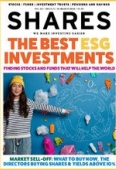Archived article
Please note that tax, investment, pension and ISA rules can change and the information and any views contained in this article may now be inaccurate.
Revealed: the directors buying shares amid the market carnage

Company directors should know the state of their business better than anyone, so the buying by directors in the wake of the market carnage has been notable.
As stock markets plummet and investors panic, selling whatever they can left, right and centre, a rising number of company executives have started snapping up shares in their own firms, apparently looking to take advantage of the discounted price.
For example, in the week commencing 9 March, when the FTSE 100 recorded its second biggest ever one-day fall, in the top 20 deals by directors in terms of value, 18 of those transactions were buys with only two sells.
In any given week it’s more common to see the opposite scenario, with directors usually selling because a portion of their earnings is derived from the awarding of shares, or they need to sell to buy a house or make another large purchase.
Other reasons directors normally sell are to meet tax or divorce bills or due to higher demand for shares from institutional investors.
‘ONLY ONE REASON THEY BUY’
Directors do have something of a duty to show restraint in choppy stock markets, and not adding fuel to the fire by dumping their shares when times get tough. But as the old Wall Street adage goes, ‘there are many reasons insiders sell, but only one reason they buy’.
Directors buying is considered more significant than directors selling as it is often a signal that they believe are the shares are undervalued.
In the FTSE 100 of late, directors at Barclays (BARC), Rio Tinto (RIO) and Melrose Industries (MRO) have all bought shares.
The latter is particularly interesting, with executive vice-chairman David Roper and chief executive Simon Peckham both buying stock,
along with chairman Justin Dowley. Roper bought at 183p a share, with Peckham buying at 170p and Dowley at 169p.
On 9 March the company reported double-digit growth in its revenue, profit and dividend, as well as a 72% jump in adjusted free cash flow.
But that hasn’t been enough for it to avoid being caught up in the market sell-off, with its share price dropping to around 140p against 245p a month ago.
The buying or selling of shares by a company’s chief executive, and/or its finance director, are considered particularly powerful indicators of a company’s prospects, as they are the ones most likely to know the outlook and underlying performance of their business.
However, in the current environment it is very difficult for even well-informed executives to take a view on what will happen next.
Barclays chairman Nigel Higgins is another who acted as the markets collapsed, buying 250,000 shares for 118p each. That compares to the 185p price the shares were trading at in January, though amid the wider market weakness the shares have since tumbled through 100p.
AIRLINE EXECUTIVES SWOOP
Airline bosses have also been buying, with directors at British Airways owner International Consolidated Airlines (IAG) and budget airline Wizz Air (WIZZ) in particular swooping, despite both companies being among the hardest hit by the fallout from the coronavirus outbreak.
Deals by directors at IAG are particularly interesting given British Airways chief executive Alex Cruz told employees on 13 March that, in the current climate, ‘airlines with a weak balance sheet, or carrying large debts, are facing a dire future’.
Javier Sanchez-Prieto, chairman and chief executive of IAG’s Spanish budget airline Vueling, bought 70,000 of the company’s Madrid-listed shares this week at €4.60 each, for a total of €322,000.
Javier Ferrán, a non-executive director at IAG who is also chairman of drinks giant Diageo (DGE), bought 85,900 shares at €4.67 each, worth just over €400,000.
For context, the shares were trading at around the 630p mark at the start of the year, while the Spanish-listed shares traded at €7.70 in January.
The stock has since more than halved in price, with airlines blindsided by sudden draconian travel bans imposed by a growing list of countries.
British Airways in particular has been affected significantly, with its London to New York route – directly affected by reciprocal travel restrictions between the UK and US – known as the ‘billion dollar route’ because it has previously generated up to $1.15bn in annual profit for the airline.
WHO HAS BEEN SELLING?
Bucking the trend of directors buying shares, London Stock Exchange (LSE) director Waqas Samad has been selling.
Samad, chief executive of LSE’s index provider subsidiary FTSE Russell, sold 20,800 shares two weeks ago at a price of £79 each, netting him £1.65m in total. Since then, LSE’s share price has fallen to around £66.
Another notable seller has been Nick Brown, managing director of identity management company GB Group (GBG:AIM).
Brown sold over 327,000 shares at 692p each on 5 March, netting a total of £2.2m. Since then the shares have tumbled below 500p.
Important information:
These articles are provided by Shares magazine which is published by AJ Bell Media, a part of AJ Bell. Shares is not written by AJ Bell.
Shares is provided for your general information and use and is not a personal recommendation to invest. It is not intended to be relied upon by you in making or not making any investment decisions. The investments referred to in these articles will not be suitable for all investors. If in doubt please seek appropriate independent financial advice.
Investors acting on the information in these articles do so at their own risk and AJ Bell Media and its staff do not accept liability for losses suffered by investors as a result of their investment decisions.

 magazine
magazine










